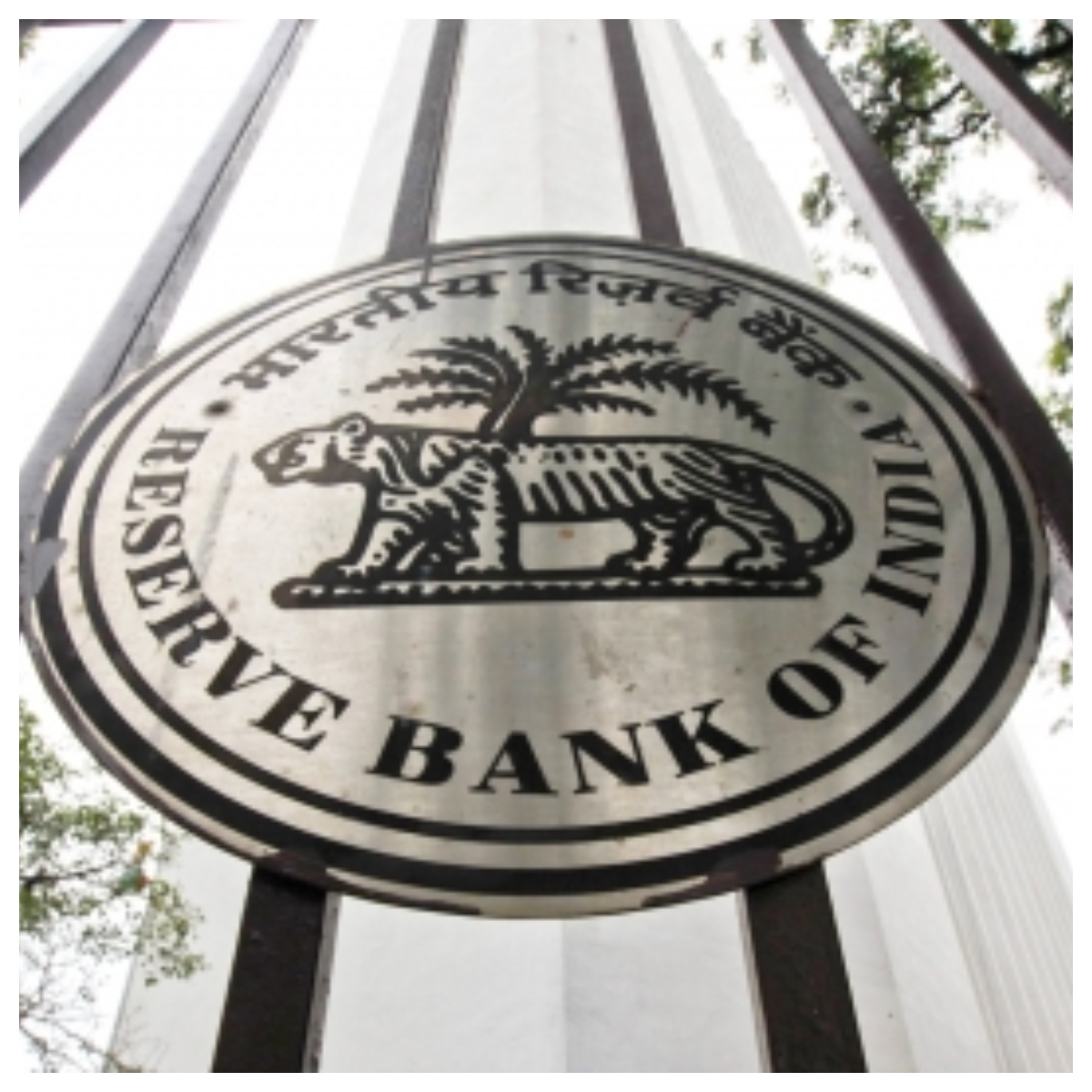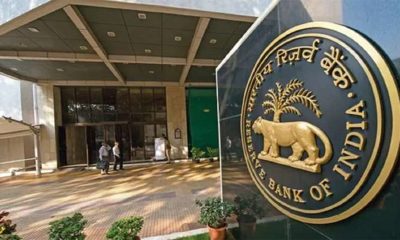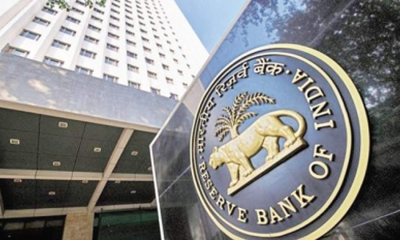Business
Here are some reactions of realtors on RBI’s policy outcome on realty sector

The Reserve Bank of India on Wednesday raised the key lending rate or repo rate by 50 basis points to 4.9 per cent to tame rising inflation, which has been now above the central bank’s 6 per cent tolerance level for four months in a row.
Repo rate is the rate at which the central bank lends short-term funds to banks.
In line with the rate hike by the RBI, some banks and non-banking finance companies too had raised their lending rates, which will essentially lead to an increase in EMIs for borrowers.
On Wednesday, RBI decided to increase the existing limits on individual housing loans by cooperative banks.
Accordingly, the limits for Tier I or Tier II urban cooperative banks shall stand revised from Rs 30 lakh or Rs 70 lakh to Rs 60 lakh or Rs 140 lakh, respectively, which essentially means doubling of the limit.
The increased limits will apply for Primary (Urban) Co-operative Banks (UCBs), and Rural Cooperative Banks (RCBs) — State Cooperative Banks and District Central Cooperative Banks.
For RCBs, the limits will increase from Rs 20 lakh to Rs 50 lakh for such banks with assessed net worth less than Rs 100 crore; and from Rs 30 lakh to Rs 75 lakh for other such RCBs.
Besides, considering the growing need for affordable housing and to realise their potential in providing credit facilities to the housing sector, the RBI decided to allow State Co-operative Banks (StCBs) and District Central Co-operative Banks to extend finance to Commercial Real Estate – Residential Housing (CRE-RH) within the existing aggregate housing finance limit of 5 per cent of their total assets.
Following are some of the reactions from real estate experts and developers on the RBI’s measures:
Rohan Pawar, CEO of Pinnacle Group said, during the pandemic, the low interest rate regime had boosted the housing demand, and RBI’s decision to hike the interest rate again by 50 basis points to 4.90 per cent was expected to tackle the tight inflation of the country.
“The increase of rates could adversely affect housing demand because of increased EMIs and lower eligibility on home loans. This will create an impact on the ongoing growth momentum in the sector in addition to increasing input costs. However, we still believe that preference of homebuyers for owning a home will continue to boost demand.”
Niranjan Hiranandani, Vice Chairman of NAREDCO said, taming steep inflation hike is a preordained measure by RBI, given the global economic ballgame. Soaring commodity prices especially with food and energy prices, plummeting currencies, supply side shocks are the foremost reasons for rising input cost.
“It is evident that home loan interest rate hike will impair the home buying rally as pay out in terms of EMI is scheduled to rise. But according to me this crater in demand sentiment is a makeshift move, as home loans are based on floating rate for a long tenure. The EMI constraint will be eased as rates are expected to normalise once the global situation is stabilised.”
The hike in the limit of individual loans by co-operative banks by 100 per cent is a welcome initiative for home buyers who opt for home loans from co-op banks.
Atul Goel, MD of Goel Ganga Group said, the RBI’s step to increase the repo rate has been on the expected lines. To curb inflation, the regulatory bodies in India were required to control liquidity circulation in the economy. For a few months, the inflation rate has been above 6 per cent, which is beyond the RBI’s safe zone.
“If not controlled, the inflationary pressure could destabilise an otherwise bullish Indian economy. Although the recent step will increase the home loan rates, an unstable economy is not conducive to the overall health of the real estate industry. For the industry to operate optimally, it is important that the economy continues to grow in a stable, inclusive, and steady fashion.”
Suren Goyal, Partner at RPS Group said, the group welcomes the step of the apex body to increase the overall repo rates and believes it will help in clamping down inflation and smoothen economic growth.
“A rise in inflation can soften the stance on an otherwise robust real estate industry. Already raw material prices are increasing and an unbridled rate of inflation will further drive the input costs northwards, therefore resulting in cost overruns for the developer fraternity.”
Manoj Gaur, CMD of Gaurs Group and President- CREDAI NCR said it has been a fine balancing act by RBI.
“We understand that the hike in repo rate by 50 basis points will impact interest rates of consumer loans and make home loan dearer right at the time when real estate sector was coming out of the throes of pandemic and affect sales in the short term. However, by reining in inflation it will ultimately benefit the real estate sector that is bogged down by high input costs.”
Amit Modi, President of CREDAI Western UP opined that the increase in the repo rate will hamper the sentiments of the buyers, especially first time home buyers who are heavily reliant on home loans.
“It will be a barrier to the growth trajectory of the revived sales post-Covid. Millions of homebuyers will be sidelined and alienated from the property markets after the hike. It will slow down the pace of sales that has taken a rise in the recent past.”
Pradeep Aggarwal, Chairman of Signature Global (India) said the repo rate hike could be termed as a reformative move, the stated aim was clear in current macro and micro economic conditions.
“There was no other option left but to rein in inflation through monetary control measures. This might slightly influence real estate, but it will not impact consumer confidence or demand. Simultaneously, increasing the 100 per cent limit of individual loans by apex bank for co-operative banks, would surely spread a positive communication among each stakeholder.”
Sanjay Sharma, Director of SKA Group said the repo rate hike comes at the time when there was a renewed buyer interest in every segments of the real estate
“This move will definitely have an impact on buyers’ sentiments but at the same time let’s wish that the step brings the expected relief and benefits the sector that is also reeling from high input costs on account of various factors including inflation.”
Dharmesh Shah, CEO of Hero Homes said that there will also be a certain increase in home loan rates that will backtrack home buyers’ aspirations to invest in property markets and impact residential sales for a short period of time.
Prateek Mittal, Executive Director at Sushma Group said the latest move will definitely help the country as well as benefit the real estate sector that is already battling high input costs on account of various external factors and the consequent increase in fuel cost.
“Though this increase will also impact the buying power of consumers, we feel the impact will be taken in stride.”
According to Sharad Mittal, Director and CEO of Motilal Oswal Real Estate Funds: “Now with mortgage loan rates set to go up, we may notice a slight demand blip in the short term but overall outlook on the sector remains strongly bullish in the long term.”
“In an interesting move, RBI has now allowed rural co-operative banks to lend towards residential housing projects. This will help improve much-needed liquidity in the sector.”
Business
New labour codes to boost formalisation, gender parity of India’s workforce: Industry leaders

New Delhi, Nov 22: India’s top industry bodies and staffing leaders on Saturday labelled the implementation of the Four Labour Codes a landmark step toward formalising the workforce, expanding social security, and aligning India’s labour framework with global standards.
The India Electronics & Semiconductor Association (IESA) said the reforms would significantly benefit the high-technology sectors by enhancing workforce stability, improving safety standards, and enabling labour flexibility with social protection.
“Mandatory appointment letters, universal minimum wages, and pan-India social security coverage (including ESIC expansion) ensure greater formalisation. This strengthens worker confidence — critical for skill-intensive manufacturing such as fabs, ATMP, component manufacturing and design centres,” said Ashok Chandak, President, IESA and SEMI India.
Provisions for fixed-term employment, faster dispute resolution, single licensing, and simplified compliance directly support the scaling of high-tech manufacturing clusters, the statement said.
Meanwhile, parity of benefits for Fixed-Term Employees (FTE) and expanded social security protections ensure a balanced, worker-centric ecosystem, he added.
Sachin Alug, CEO of NLB Services, a technology and digital talent provider, said the reforms were long overdue for India’s gig economy and will offer protection to a fast-growing but previously unorganised workforce.
The new laws are also expected to promote gender parity in the workforce by opening doors to wider opportunities across diverse sectors. Additionally, other groups such as”
He also pointed out that new laws will promote gender parity and contract workers, youth workers, and fixed-term employees will benefit from clearer working-hour norms, expanded social security, minimum wage protections, and health benefits.
“By simplifying compliance and unifying the regulatory framework, the codes can significantly expand formal employment, bringing millions of workers, especially in industries that rely on contract, temporary, and project-based roles, into the fold of structured, protected work,” said Balasubramanian A, Senior Vice President, TeamLease Services.
“National floor minimum wage creates a consistent benchmark across states and is an important step in India’s evolution from a minimum-wage economy to a living-wage economy,” he noted.
Suchita Dutta, Executive Director of Indian Staffing Federation (ISF), said the codes simplify compliance for employers, reduce regulatory burdens, and foster a more flexible hiring environment — crucial for the staffing industry, which has long advocated for such changes to unlock formal job creation.
The government, on November 21, implemented the Four Labour Codes — the Code on Wages (2019), Industrial Relations Code (2020), Code on Social Security (2020), and Occupational Safety, Health and Working Conditions (OSHWC) Code (2020) — repealing and rationalising 29 existing central labour laws.
Business
Nifty, Sensex continue rally for second week despite FII outflows

Mumbai, Nov 22: Indian equity benchmarks made marginal gains for the second week, supported by stronger second quarter (Q2) earnings, easing inflation and optimism around the India-US trade negotiations.
Benchmark indices Nifty and Sensex edged higher 0.68 and 0.50 per cent during the week to close at 26,068 and 85,231, respectively.
Analysts said that a moderation in FII selling due to expectations of earnings upgrades in H2 FY26 also supported the rally. However, markets turned volatile on Friday amid weak global cues. The Nifty fell after failing to cross its previous all-time highs of 26,277, ending its two-day advance.
Broader indices underperformed, with the Nifty Midcap100 and Smallcap100 ending the week down 0.76 per cent and 2.2 per cent, respectively.
Though IT stocks faced selling pressure due to weakness in the US tech shares, it was the biggest weekly gainer. Nifty Auto and Services followed as the secoral gainers during the week. On Friday, metals and realty were the worst hit, both dropping over 2 per cent, followed by PSU banks, financial services and media.
A better-than-expected non-farm payroll dimmed hopes of a US Federal Reserve rate cut in December putting pressure on global equities. Resultantly gold also witnessed selling pressure while INR declined to a new low.
The oil prices declined due to the US’s renewed push for a Russia-Ukraine peace proposal.
“The market may witness some profit booking in the near term if the pressure on Indian rupee persists. In the week ahead, investors will also have a close vigil on trade developments and economic data like IIP and Q2 FY26 GDP data to get the market direction,” said Vinod Nair, Head of Research, Geojit Investments Limited.
Analysts said that they expect markets to remain firm next week supported by buying on dips, improving demand outlook in Q3 and resilient flows.
Business
Four Labour Codes are most progressive reforms for workers since Independence: PM Modi

New Delhi, Nov 21: Prime Minister Narendra Modi on Friday said the government has given effect to the Four Labour Codes, which are one of the most comprehensive and progressive labour-oriented reforms since Independence.
“It greatly empowers our workers. It also significantly simplifies compliance and promotes Ease of Doing Business,” the Prime Minister remarked.
He said that these Codes will serve as a strong foundation for universal social security, minimum and timely payment of wages, safe workplaces and remunerative opportunities for our people, especially ‘Nari Shakti and Yuva Shakti’.
“It will build a future-ready ecosystem that protects the rights of workers and strengthens India’s economic growth. These reforms will boost job creation, drive productivity and accelerate our journey towards a Viksit Bharat,” he added.
The four labour codes include the Code on Wages, 2019, the Industrial Relations Code, 2020, the Code on Social Security, 2020 and the Occupational Safety, Health and Working Conditions Code, 2020, with effect from November 21, rationalising 29 existing labour laws.
With the implementation of the Labour Codes, it has now become mandatory for employers to issue appointment letters to all workers, which provides written proof to ensure transparency, job security, and fixed employment. Earlier, no mandatory appointment letters were required.
Under Code on Social Security, 2020, all workers, including gig and platform workers, will get social security coverage. All workers will get PF, ESIC, insurance, and other social security benefits. Earlier, there was only limited security coverage.
Under the Code on Wages, 2019, all workers will receive a statutory right minimum wage payment which wages and timely payment will ensure financial security. Earlier, minimum wages applied only to scheduled industries or employments; large sections of workers remained uncovered.
The Labour codes also ensure that employers must provide all workers above the age of 40 years with a free annual health check-up and promote a timely preventive healthcare culture. Earlier, there was no legal requirement for employers to provide free annual health check-ups to workers.
The codes also make it mandatory for employers to provide timely wages, to ensure financial stability, reducing work stress and boosting the overall morale of the workers. Earlier, there was no mandatory compliance for employers’ payment of wages.
The new law permits women to work at night and in all types of work across all establishments, subject to their consent and required safety measures. Women will also get equal opportunities to earn higher incomes in high-paying job roles. Earlier, women’s employment in night shifts and certain occupations was restricted.
The new codes also extend ESIC coverage and benefits pan-India – voluntary for establishments with fewer than 10 employees, and mandatory for establishments with even one employee engaged in hazardous processes.
Social protection coverage will be expanded to all workers. Earlier, ESIC coverage was limited to notified areas and specific industries; establishments with fewer than 10 employees were generally excluded, and hazardous-process units did not have uniform mandatory ESIC coverage across India.
The codes also ease the compliance burden for workers by providing for single registration, a PAN-India single license and a single return. Earlier, multiple registrations, licenses and returns across various labour laws were required.
-

 Crime3 years ago
Crime3 years agoClass 10 student jumps to death in Jaipur
-

 Maharashtra1 year ago
Maharashtra1 year agoMumbai Local Train Update: Central Railway’s New Timetable Comes Into Effect; Check Full List Of Revised Timings & Stations
-

 Maharashtra1 year ago
Maharashtra1 year agoMumbai To Go Toll-Free Tonight! Maharashtra Govt Announces Complete Toll Waiver For Light Motor Vehicles At All 5 Entry Points Of City
-

 Maharashtra1 year ago
Maharashtra1 year agoFalse photo of Imtiaz Jaleel’s rally, exposing the fooling conspiracy
-

 National News1 year ago
National News1 year agoMinistry of Railways rolls out Special Drive 4.0 with focus on digitisation, cleanliness, inclusiveness and grievance redressal
-

 Maharashtra1 year ago
Maharashtra1 year agoMaharashtra Elections 2024: Mumbai Metro & BEST Services Extended Till Midnight On Voting Day
-

 National News1 year ago
National News1 year agoJ&K: 4 Jawans Killed, 28 Injured After Bus Carrying BSF Personnel For Poll Duty Falls Into Gorge In Budgam; Terrifying Visuals Surface
-

 Crime1 year ago
Crime1 year agoBaba Siddique Murder: Mumbai Police Unable To Get Lawrence Bishnoi Custody Due To Home Ministry Order, Says Report
















